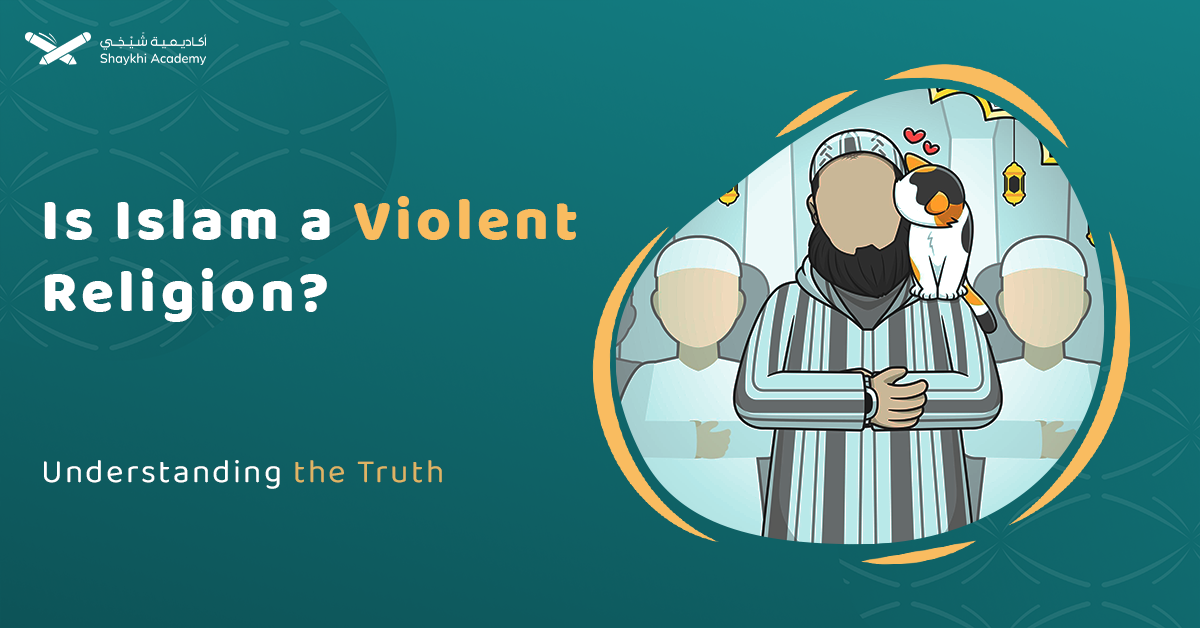First of all, it should be noted that a comprehensive method is different from the ones who follow it. The method is not that small group affiliates with it and may be applying it in a disingenuous manner. Methods and individuals are different principles, we should not be confused with one another.
A continually evolving list of fake allegations about Islam has been identified over the past three decades of research about Islam.
Is Islam a violent religion? You may have heard this pattern of questions repeatedly over the last decades. Or you might have been trying to answer it but you couldn’t. If this is so, then, complete reading this article until the end.
“Don’t hear about me, hear from me”. This is what we will try to do in this article. We will present the different claims and accusations against Islam, then we will offer answers and evidence that falsify these allegations. Keep reading.
Is Islam A Violent Religion?
Islam is often accused of being a violent religion, but a closer examination of the Quran and historical context paints a different picture. The Quran prioritizes peace over conflict, with the term “peace” appearing 146 times compared to the word “war,” which is mentioned only six times.
Moreover, the concept of “no compulsion in religion” underscores Islam’s principle of voluntary belief rather than forced conversion.
Historical battles involving the Prophet Muhammad (PBUH) were primarily defensive, as evidenced by the Battle of Badr and the Conquest of Makkah, where even after victory, the Prophet exhibited unparalleled mercy by pardoning his enemies.
The spread of Islam was not driven by conquest but by justice and knowledge, leading to integration rather than exploitation. Unlike typical conquerors, Muslims respected the local cultures and provided opportunities for voluntary conversion.
This inclusivity is evident in regions where Islam spread without coercion, leaving many non-Muslims free to practice their faith. In contrast to the atrocities committed by other civilizations and religions throughout history, Islam’s record shows a clear preference for peace, mercy, and coexistence, challenging the baseless allegations of violence and genocide.
Let’s discuss them indetails:
Does Islam Wage Wars Against Others?
“Are the cultures of Islam more violent than other cultures?” Islam is a military-political world view. The “sacred” book of Islam presents the “House of Islam” (the believers) and the “House of War” (the non-believers), and it is the obligation of all believers to fight the non-believers until they submit to Allah, and adopt Shariah law”. Gregory Davis (2006)
Here is the answer to this counterfeit allegation attached by hard evidences:
1. The Word “Peace” Versus the Word “War.” in the Holy Quran
The word “war” is mentioned in the Holy Quran with its derivatives six times versus the mention of the word “peace” 146 times. This obviously indicates that the Holy Quran’s vocabularies abhor war and abhor its instruments.
In spite of the many names of the sword in the Arabic language – more than a thousand names – none of these names were mentioned in the Holy Quran, not singular, not dual or plural. Is this a violent religion? I will leave your conscience to answer this question. Visit the pager more details about this point.
2. No Compulsion in Islam
Islam compels no one to become a Muslim. Consequently, there is no so-called “House of War” (the non-believers), in Islam. There is no obligation for all the believers to fight the non-believers until they submit to Islam.
Allah says,
“There shall be no compulsion in religion; the right way has become distinct from the wrong way” al-Baqarah. 256
“لَا إِكْرَاهَ فِي الدِّينِ ۖ قَدْ تَبَيَّنَ الرُّشْدُ مِنَ الْغَيِّ ۚ”
Islam was merely ordering combat against its aggressors, as a legitimate right to self-defense. Allah says:
“And fight in the cause of God those who fight you, but do not commit aggression; God does not love the aggressors” Surah al-Baqarah Verse, No. 190
“وَقَاتِلُوا فِي سَبِيلِ اللَّهِ الَّذِينَ يُقَاتِلُونَكُمْ وَلَا تَعْتَدُوا ۚ إِنَّ اللَّهَ لَا يُحِبُّ الْمُعْتَدِينَ”.
Does Islam Encourage Invasions and Conquest of Lands?
“The highest values in most Islam are the conquest of lands and, at least among a minority of Muslims, the imposition of Shariah law. Once this is achieved it is argued that paradise will prevail on earth. It is most unfortunate that such unsophisticated thinking is causing so much violence. (Lewis, 2003)
Here is hard incontrovertible evidence that categorically refutes all these allegations and shows that those who made them were lying.
1. The Prophet’s Battles Were Defensive Rather Than Offensive
Throughout history, nations often wage war to defend their sovereignty. The prophet’s battles were wrongly named “invasions”. In fact, the prophet rarely left his town to invade a folk or a tribe. But his enemies were those who came to invade at his homeland.
2. The First Battle in Islam Took Place on the Muslims’ Backyard
The first battle in Islam was called Badr battle. The battlefield was in Madinah where the prophet Mohammed “peace be upon him” and his companion’s dwell. What does this mean? It means that the unbelievers of Makkah invaded him at his own homeland and he was in self-defense status about his people and his possessions. This is recognized by the United Nations Constitution as “The right of self-defense”.
3. The Second and Third Battles in Islam Occurred on the Muslims’ Land
The second battle also took place on Ohed Mountain at Madinah. What does this mean? It means that Mohammed (PBUH) went nowhere to invade anyone. But he was defending his homeland against raiders.
Where did the third battle take place? The answer is, “In Madinah” the Muslims homeland. Did you know that the prophet (PBUH) and his companions dug a trench around the city to defend themselves.
4. The Prophet Returned to Madinah After the Conquest of Mecca
The Conquest of Makkah took place eight years after the Muslims had migrated from Makkah to Madinah. The Prophet (PBUH) with nearly ten thousand of his Companions marched towards Makkah to open it.
If Muslims occupy lands because then, the Prophet and his companions returned to Madinah and did not stay in Makkah after conquesting it although it was the most beloved land to his heart.
5. Great Mercy, Not Violence
The prophet (PBUH) conquested Makkah without killing anybody or destroying anything. He asked Makkah’s nonbelievers, “What would you think I will do of you?” They begged him saying, “You are a kind brother and a son of a kind brother”. The prophet (PBUH) said, “Go. You are all free and safe.”
Is this a violent act? Prophet Mohamed (Peace be upon him) forgave them although they killed his uncle and his daughter. He forgave them although they forced him to move away from Makkah and to leave his possessions.
6. Eternal Conquest
However, the advantage of Muslim conquests is not just their amplitude and speed, but its major advantage is that it was an eternal conquest. It is not known about the Muslims that they entered a country and Islam came out of it. Because they did not open a country with their swords like all conquerors, rather, they opened minds and hearts with justice and knowledge.
Countries that have been opened by the Muslims became Muslims and integrated with Muslims. They even defended Islam rather than opposing it. Unlike the countries that are conquered by non-Muslims, they stay subservient as long as the sword remains on their heads. If they feel a weakness of their conquerors, they immediately jump on, expel them and return to the way they were on.
7. Islamic Conquests are Totally Different from Other Conquests
It is wrong to consider the Islamic conquests are similar to the other conquests of the various nations in different eras. As the Islamic conquest has a special nature that makes it distinct from all other conquests. These conquests opened for them a special door in history.
All conquests aimed at annexing new countries for the sake of their properties, and making use of their resources. But the Muslims’ goal was not to annex countries to the Islamic homeland, or to suck blood and money from their peoples or to exploit their natural resources and wealth. The real objective was to spread the true religion of Islam and to exalt the word of Allah and justice.
8. Life is Not a Desire; Afterlife is a Concern
In the Qadisiyah battle, the Persians army commander, “Rustom” asked the Muslims commander to send him a man of wisdom, Rustom said to him, “Return to your country, and we will not prevent your trade from entering our country”.
The man said, “Life is not our desire, but the afterlife is our concern”.
Rustom said, “Do you see that if we embrace your religion, you will return from our country?”
The man said, “Yes, by the name of my Lord, and we will not enter your country except for trade”.
Did Islam Spread by the Sword?
“Another factor is the importance that most Islam gives for spreading Islam by force. When asked to identify the best period of Islam many Muslims mention the period when Islam expanded into North Africa, Spain and the Balkans (Gabriel, 2006; Triandis, 2009b). That was defined as “the Golden Period of Islam”. Yet that was an extraordinarily violent period in Islam”. (Gabriel, 2006).
Here is hard incontrovertible evidence that categorically refutes all these allegations and show that those who made them were lying.
1. Conversion to Islam is a Choice, not a Compulsion
Wherever Muslims landed, they offered Islam as a choice not as an obligation. If the country’s people accepted Islam, followed it, and announced testimony, Muslims would turn away, and consider them as brothers. There is no difference between the commander of the Muslims and an ordinary Muslim of them; All are equal in rights and duties.
If they do not accept Islam, Muslims offer them to pay tribute (jizya), which is much less than what they had paid to their kings and leaders. They give them the freedom to remain true to their religion.
If Islam was spread by the sword, why were there millions of people who remained professing other religions in countries that the Muslims had conquered? And why did people who embraced Islam did not leave Islam when Muslims left their countries?
2. Hugh Kennedy’s Fair-minded Opinion
When he was asked, (“Was Islam Spread by the Sword? “), Hugh Kennedy offered a simple but much more useful starting point to our investigation: He answered, “Islam was not spread by the sword but without the sword it would not have spread.” In a hint that without the sword, Muslims wouldn’t have been able to defend Islam.
Has Islam Shed Abundant Blood and Committed Genocides?
“For example, Abu Bakr, the immediate successor of Muhammad, killed 84,000 Muslims because they refused to pay the 10 percent tax, as required by Islam. By today’s standards, this “Rightly Guided Caliph” (as Muslims call him) was a war criminal guilty of genocide.” Ramis. The Yale Conference on Religion and Violence (Yale University, New Haven, CT, February 16, 2008).
Here is hard incontrovertible evidence that categorically refutes all these allegations and show that those who made them were lying.
1. No Accurate Count of Deaths
The exact numbers of people who were killed and wounded in the apostasy wars from both sides cannot be determined because the war lasted a long time and involved many different battles and events. The number of deaths must have been high from both sides. Visit the page of Shaykhi Academy’s Islamic Studies Online Course for more details about this point
2. Dishonesty in Viewing and Listing Information
The claimant is dishonest in presenting and listing the above allegation. The unfaithful claimant mentioned the number of deaths of apostates and did not mention the number of deaths of Muslims, although they were in thousands. It was a war, not genocide and deaths were from both sides.
3. A Witness of Their Own Folk Testified:
A. “About 1 million Muslims were killed between 1095 and 1208, when the Crusaders attacked the Muslims. This was, when taking into account the number of people on earth at the time, as lethal as the Nazi Holocaust.” Thomas (2009)
B. Most Muslims oppose violence and their very way of greeting each other, “Peace be upon you.” They do value peace. Gabriel, 2006),
4. Islam Never Committed Genocides, Maybe Other Religions.
“Islam has never killed millions of people the way the wars of other religions did. The Inquisition in Europe killed 350,000 people. The Wars of Religion in Europe in the 17th century killed 6 million people. Taking into account the size of the population at that time, the number of deaths was proportionally as high in the 17th century as in the 20th, with its two World Wars. These were the two most violent periods in human history.” Allawi (2009)
Short capsules:
- Hitler killed forty million people during the Second World War. Was he a Muslim?
- Holacoa committed heinous massacres. Was he a Muslim?
- Churchill, Mussolini, and Stalin killed millions. Were they Muslims?
- Bush Father and Son killed thousands without a reason. Were they Muslims?
- Netanyahu killed 18000 innocent children in Gaza. Is he a Muslim?
Read more about: 11 Islam Major Beliefs – Basics
Start Your Journey of Learning Islamic History with Shaykhi Academy
Shaykhi Academy presents large sets of enhanced knowledge and information about the affluence and abundance of Islamic history.
Shaykhi Academy’s Islamic Studies Online Course is a unique course for all learners. The course covers many essential data about all debating issues about Islam. It also deals with additional thoughts and points of view.
Shaykhi Academy’s all-inclusive lessons present immersive Islamic knowledge tailored professionally to attract the learners’ admiration.
Shaykhi Academy’s Islamic Studies Online Course is taught under the auspices of the experienced tutors Dr. Mahmoud Al Assal and Sh. Luqman ElKasabany.
All the teaching staff of Shaykhi Academy graduated from Al-Azhr Ash-Sharif University. They had wonderful experiences in the Islamic studies field. It is an essential matter to be taught under the aegis of such quality.
Why Choose Shaykhi Academy?
- Connect with highly qualified native tutors.
- Flexible scheduling to suit your busy lifestyle.
- Affordable classes tailored for all levels.
- Accessible from anywhere around the globe.
Discover Our Range of Courses:
- Arabic Noorani Qaida: Lay a solid foundation for Quranic studies.
- Online Quran Classes for Kids: Engaging lessons for lifelong learning.
- Tajweed Rules for Kids: Learn to recite with confidence.
- Quran Hifz for Kids: Step-by-step guidance to memorize the Quran.
- Quran for Adults: Introduce yourself to Quran reading and Tajweed rules.
- Online Arabic Courses: Master the language of the Quran.
- Islamic Studies: A wide range of topics related to Islam, including theology, law, Quranic studies, Hadith.
Don’t Miss Out on Your Chance to Excel!
Whether you’re a beginner or seeking advanced knowledge, Shaykhi Academy can guide you! Book your free trial now!

Conclusion
The idea of accusing Islam of being a religion that calls for violence has existed since ages. This accusation springs from the malice of the enemies of Islam. Such claims lack a subjective narrative coherence and logical presentation. But it is always the fate of the fruit tree to be thrown by stones.
A steadfast grasp of the answers to these false allegations and fake allegations protects young Muslims from these perverse intellectual claims.

















































